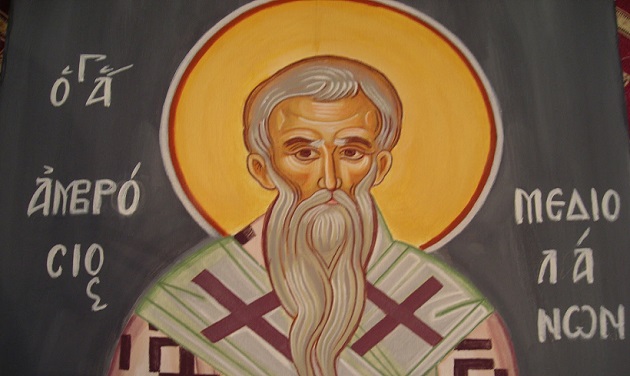A Bishop Stands up to the Most Powerful Man on the Planet.
7 December 2013On 7 December, we celebrate the memory of Saint Ambrose, Bishop of Mediolanum, today’s Milan, Born in the 4th century, he was an important man and a great legal expert who became governor of Milan and the surrounding region. He was a just, prudent person and a catechumen, i. e. he was preparing for baptism. The Bishop of Milan died and then the Orthodox quarrelled with the Arians over the succession. As the civil governor, Ambrose went to quell the unrest and bring peace to the city. He went and spoke and succeeded in mollifying them, since he was a wise orator and a virtuous man, even though he had not yet been baptized.
Then a young child cried aloud “Ambrose for bishop”. It was the voice of God. It was the call of the Lord. He, of course, wanted nothing to do with it and his Life tells us that when he heard all the people, Orthodox and heretics, acclaiming him and shouting “Worthy” [the approval of the laity for an ordination or consecration] he made off as best he could and, as night fell, he mounted his horse and set off into the dark. When dawn broke, however, where was he? Back in the same place he’d started out from in the first place: the courtyard of the church. Then he realized that God wanted him for this position. How could he say no to God?
And so the great Ambrose became Bishop of Milan, taking care of both Orthodox and heretics, because at that time the Church was greatly troubled by Arianism and its offshoots. With his divine discourse and his holy grace he brought countless people into the Church and protected all those who were weak or in difficulties. He had such boldness that he imposed a penance on the emperor Theodosius the Great himself. A revolt had taken place in Thessaloniki and Theodosius had given orders for 7,000 insurgents to be killed. When Theodosius went into the church [in Milan] and went into the sanctuary Saint Ambrose told him :” Get out!”.
And he said this to the most powerful man on the planet at the time. And what was Theodosius’ reaction. He is also a saint of the Church and he agreed. He accepted an eight-month penance. He was not to take communion, nor perform any of his official duties. He agreed with extreme humility and great obedience. Because he’d also realized a very important thing: that we cannot oppose the Church in any way. Neither the Church nor God. What a great man he was, too. If you’re in charge of a whole empire, you’ll make mistakes. The great thing about Theodosius was that he accepted his penance and agreed to it. And he repented. An on Christmas Day, what did he do? He went to church and made a prostration before the bishop and the whole of the congregation and, in tears, officially asked for forgiveness. And he was restored. Theodosius the Great was reinstated!
He is also numbered among the saints. Because, while Saint Constantine the Great brought religious freedom to the empire and the world, Theodosius the Great chose Orthodoxy as the official religion of his state, though it was in danger from Goths, barbarians, heretics, Jews and pagans, all of whom were raging against it. But the emperor took the Church- Orthodoxy- under his protection. In other words, he placed himself at the disposal of the Church and defended Orthodox dogma. This was very important, all the more so since it continues to be in force to this day. Saint Ambrose fell asleep in the Lord in 397, in the city where the Edict of Milan had been agreed. This was the consensus between Constantine the Great and Licinius concerning religious toleration. In other words that there would be religious freedom, which is still the case today.
Archimandrite Ananias Koustenis, Χειμερινό Συναξάρι [Winter’s Synaxarium],vol. I, Akti Publications, Lefkosia, 2008, pp. 32-7 (excerpts).The English phrase “When in Rome, do as the Romans” is also attributed to Saint Ambrose. In its earliest attestation it reads: “si fueris Romae, Romano vivito more; si fueris alibi, vivito sicut ibi” (If you are in Rome, live in the Roman way; if you are elsewhere, live as they do there”). It appears to have originated in Ambrose’ advice to Augustine regarding the importance of observing local practices: “When I’m in Rome, I fast on Saturday; when I’m in Milan, I don’t. Follow the custom of the church where you are”. Very sensible advice. It can still be seen in operation today, for example when people from “the world” visit the Holy Mountain and observe the Old Calendar, or when monks from Athos come into “the world” and follow the New. WJL.







